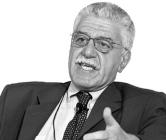We are celebrating the 10-year anniversary of Debats d’Educació by giving the educational community the opportunity to air its views
Collaboration for educational change
In a society like ours, knowledge so pervades the whole range of economic and social activities that it can scarcely be confined to the scope of educational institutions or specific activity groups. In such a situation, we can surely not reasonably expect schools to be able to respond in isolation to the demands and opportunities generated in a world in which networked collaboration is progressively shaping the most significant forms of work, productivity and cultural output.
The fact is that outside the walls of educational institutions, and not necessarily within their immediate surroundings, families, other schools, associations, public, semi-public and private informal groups and other stakeholders have objectives which can often link up with the educational purposes and needs of a school. They may, then, not only be willing to collaborate, but will often have in place appropriate mechanisms and resources for this, through networks for cooperation of varying structures, extents and durations.
The organisational solutions inherent in the traditional school are not always versatile enough in order to respond with innovative solutions to a constantly changing context. In order to address this, educational institutions, just as other sectors of society have done, must learn to find new formulae allowing them to generate and collaborate on shared innovation projects comprising horizontal and flexible networks which may find ICT to be the most efficient instrument. Although to this end the web offers a powerful structure for collaboration, the expansion of innovation and social cohesion, we must not overlook the fact that the capacity of schools to innovate depends to a great extent on the flexibility which they enjoy as organisations in terms of shifting educational activity from their own institutions towards networked collaboration.
The study of genuine experiences of innovation in the field of education which have successfully established distinctive means of collaboration, with an extensive concept of the educational community, and an analysis of the conditions which education systems offer to allow these experiences to emerge, should serve to generate the type of knowledge which can be used to sustain and extend the forms of educational innovation required by the schools of the future.
Who should instigate the changes required by the education of the future? How can a commitment by the whole educational community to improving the educational system be fostered? Can we make collaboration a genuine driving force behind the continuous enhancement of learning processes? How are roles and responsibilities redefined in collaborative contexts? How can we also make non-educational actors jointly responsible?
The 3 things they have learned...
- 1The first thing I learned is that changing education is much more difficult than we imagine
- 2I secondly learned that there is no contradiction between change and stability
- 3Thirdly, I learned that the key is a change in the professional culture of teachers
- 1The necessary educational transformation will only be possible with the cooperation of society
- 2We are unaware of the competencies and skills that workers will need in 10 to 20 years
- 3We are moving towards a cooperation model led by civil society where public administrations are just another stakeholder













 The texts published on this website are, unless otherwise indicated, covered by the Creative Commons Spain Attribution 3.0 licence. You may copy, distribute, transmit and adapt the work, provided you attribute it (authorship, journal name, publisher) in the manner specified by the author(s) or licensor(s). The full text of the licence can be consulted here:
The texts published on this website are, unless otherwise indicated, covered by the Creative Commons Spain Attribution 3.0 licence. You may copy, distribute, transmit and adapt the work, provided you attribute it (authorship, journal name, publisher) in the manner specified by the author(s) or licensor(s). The full text of the licence can be consulted here: